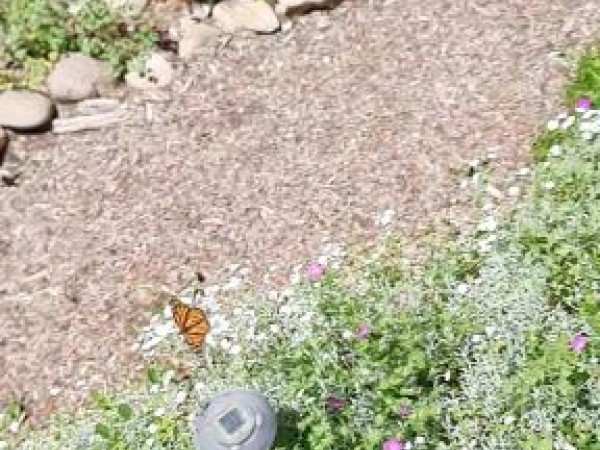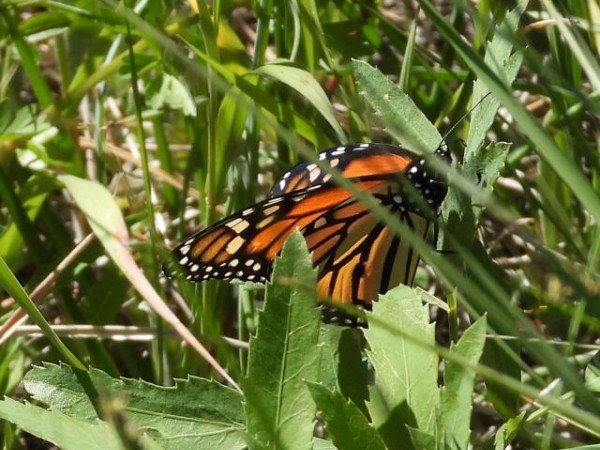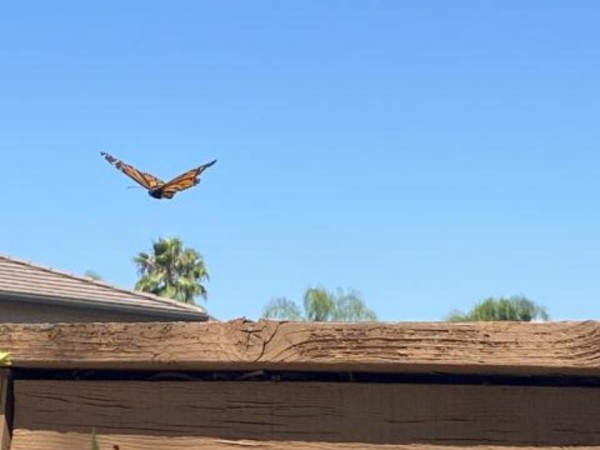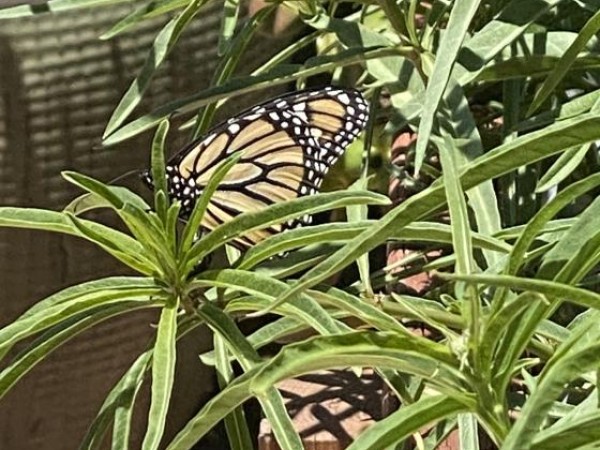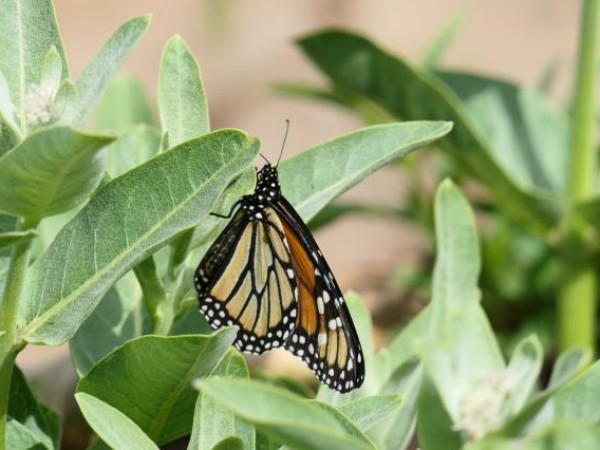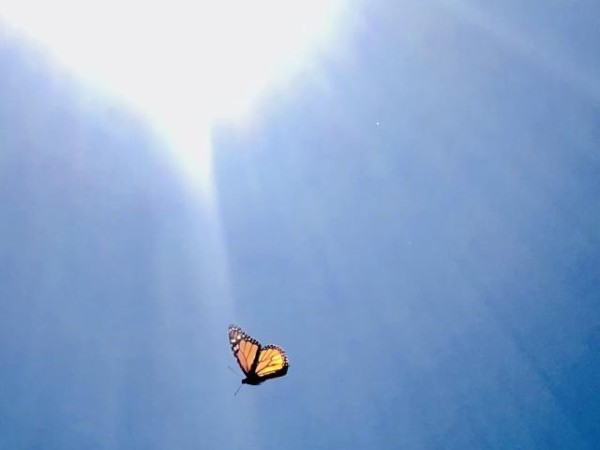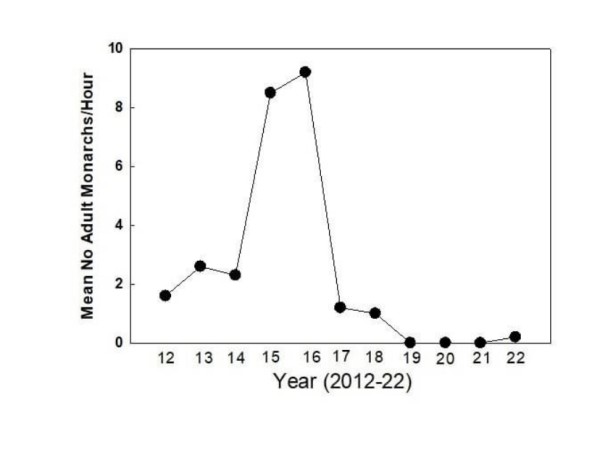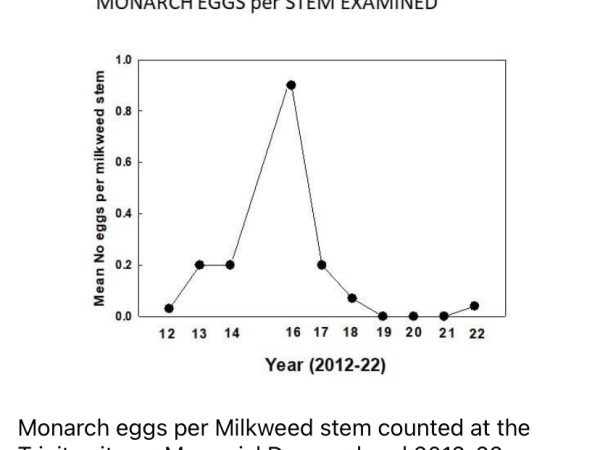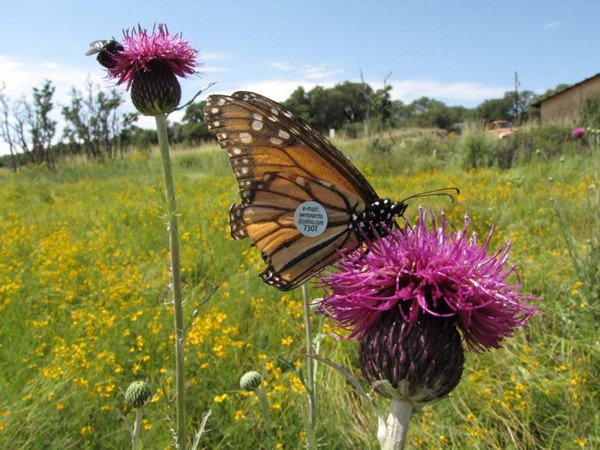Letter from Gail Morris: Western Monarch Spring 2022 Report #11
Published: 06/07/2022
Dear Western Monarch Friends,
First sightings of monarchs are now reported across the western states as far north as Oregon and Idaho to the delight of observers who missed their flight the last two years. Meanwhile monarchs are now appearing in the higher elevations in Arizona as well as in California, Utah and New Mexico. Northern movement will cease soon as monarchs multiply in their summer breeding grounds around the West.
Western Monarch Sightings
Here is a sample of First Sightings of monarchs across the West this week:
Ann in Middleton, Idaho, reported one monarch on May 28. “Single butterfly, landed on spruce for quite awhile, then buzzed all the milkweed plants. Did not see any eggs at this time.”
David found one monarch in Trinity Center, California on May 29. “One male resting in grass then flew north up the Trinity River.”
Julie in Murrieta, California saw one monarch on May 30. “First one this year. This time last year I had lots already. This was a male. He stayed all day. No female around.”
Laura in Temecula, California, reported her first monarchs on June 1. “Observed 2 separate adult monarchs laying eggs and nectaring on blooming narrow leaf milkweed planted in my garden. Also noted numerous eggs on milkweed plants as well.”
Stephani in Shaw, Oregon, saw one monarch on June 2. “Laying eggs on Showy Milkweed.”
Natasha reported one monarch in Dutch John, Utah on June 4. “Saw right along the Green River corridor.”
Take a moment and look at the many monarch reports in southern California as well – thanks to everyone in the West for reporting hopeful first sightings, monarch adults, eggs and larvae as well this season.
Trinity River Expedition
Dr. David James from Washington Stat University reports:
I have been monitoring Monarch populations on Memorial Day weekend along the Trinity River in northern California for a decade. Our tenth anniversary visit this past weekend provided some welcome news after three consecutive years with no Monarchs seen. Yesterday (May 30) we sighted the first Monarch flying north along the Trinity River since 2018. (Be sure to see the photo Dr. David James submitted to Journey North!) Only one was spotted but this was likely because of cool weather not only yesterday but for much of this spring so far in northern CA and the PNW. As a result, plants and animals are about 2-3 weeks behind normal seasonality and this includes Monarchs.
Numbers of migrating Monarchs in N CA, OR and WA will increase in the next two weeks. Already, 2 have been reported from S OR (Medford, Oregon) one possible in N OR (McMinnville) and one near Boise, ID. However, time will run out for these migrants as migration generally finishes around mid-June. So, they may not get the time to reach far N WA and S BC in numbers this summer. Evidence that a number of female Monarchs have already passed through the Trinity area in N CA, was provided by our finding yesterday of 68 eggs. We had to examine 1537 milkweed stems to get this number, but it is still a hopeful sign given that for 3 years we did not find a single egg! The western Monarch population still has some way to go to sustain the rebound in numbers seen last winter, but they are off to a decent start. Just keep your fingers crossed for 2 weeks of warm sunshine to aid their migration into the PNW!
The race is on! The race against time for Monarchs to colonize the Pacific Northwest. The propensity to migrate will gradually decrease over the next week or so and terminate by mid-month, so time is short. The good news is that the butterflies are already off to a flying start with no less than ten new sightings in OR and ID in the past ten days! Yesterday alone (June 2), there were 4 new reports of Monarchs ranging from Medford to Portland in Oregon. The push north is clearly strong and aided by winds predominantly out of the south. I fully expect to receive reports of Monarchs in Washington this weekend or next week. The eggs we found near the Trinity River in N CA (all freshly laid) were no doubt laid by northward-bound females that are now in Oregon. One of these females was spotted by Stephanie Hazen yesterday laying eggs on her milkweed in Salem, Oregon. Everybody in Oregon, Idaho and Washington, please keep your eyes open for Monarchs visiting your milkweed patch over the next few weeks!
Your reports as well as Dr. David James’ exciting find along the Trinity River offers great hope for this summer’s monarch breeding season. Send in your reports from throughout the West to Journey North to document their growing population.
Send in your reports!
If you are out this week and see monarchs of any life stage, be sure to report them to Journey North—whether they are adults or eggs or larvae. Provide as much information as you can such as weather conditions (it’s okay to estimate). Your detailed description of what you see can include, but is not limited to, the monarch’s gender and activity and, if known, the type of flowers if they are nectaring. If you can, observe the condition of the wings—fresh and new or worn and tattered or something in between. This helps us learn more about monarch age and survival. We realize it isn’t always possible, but please take a photo if you can. Thanks so much for your help.
Gail Morris is the Coordinator of the Southwest Monarch Study (www.swmonarchs.org), a Monarch Watch Conservation Specialist, and the Vice President of the Monarch Butterfly Fund, the Central Arizona Butterfly Association, and the Western Monarch Advocates. The Western Monarch Population News is based on comments provided to Gail Morris. We hope to increase the number of sightings and therefore photos and comments entered into Journey North. We rely on the volunteers who communicate regularly with Gail and who agree to participate in our effort to increase awareness of the population of western Monarchs. You can reach her at gail@swmonarchs.or

